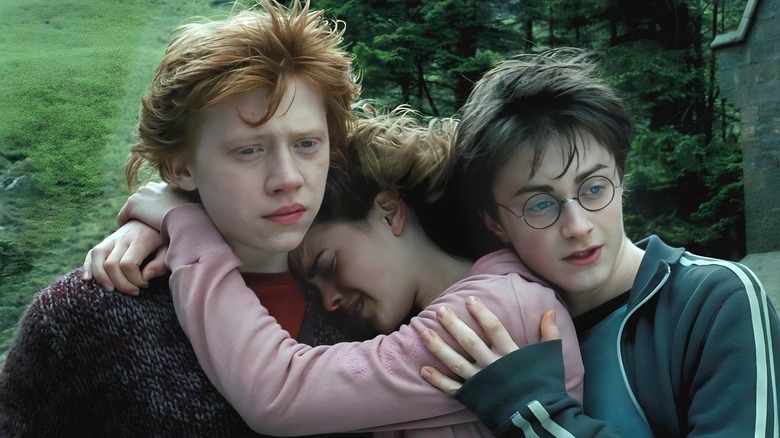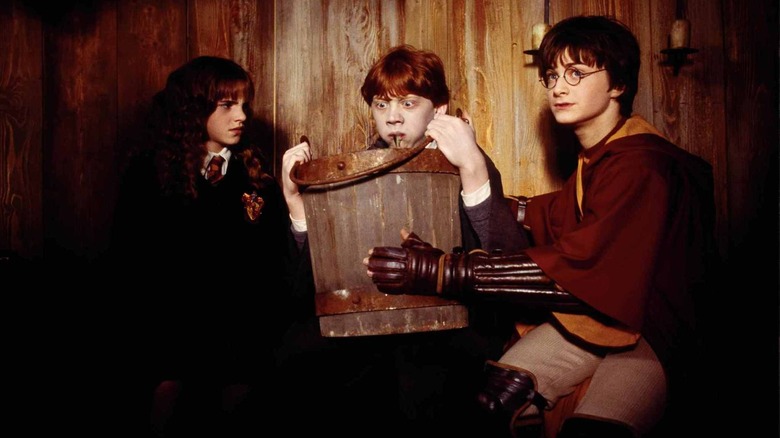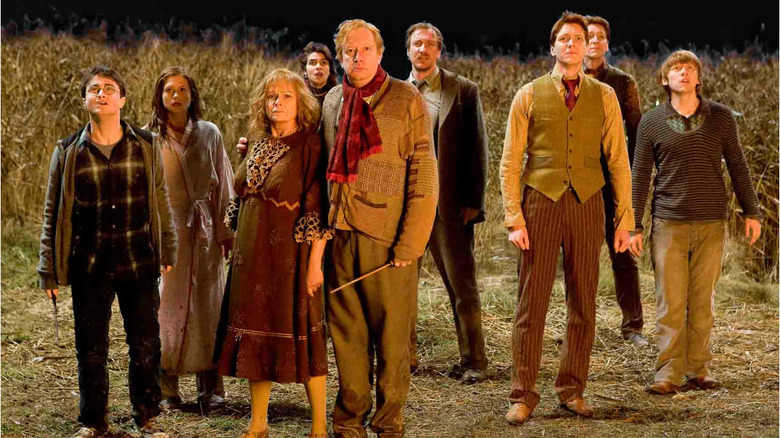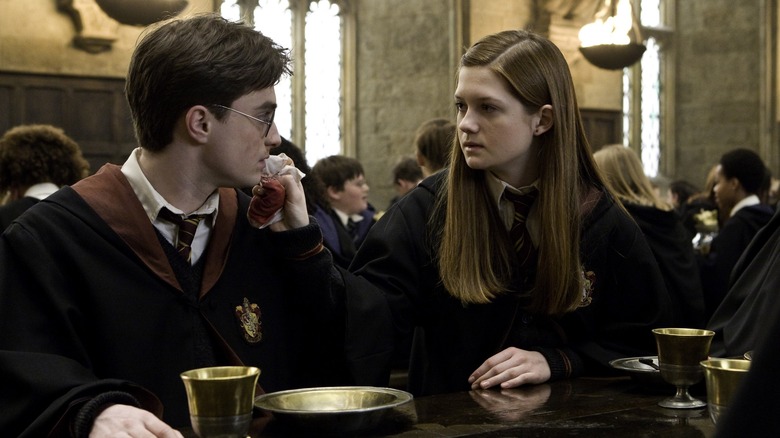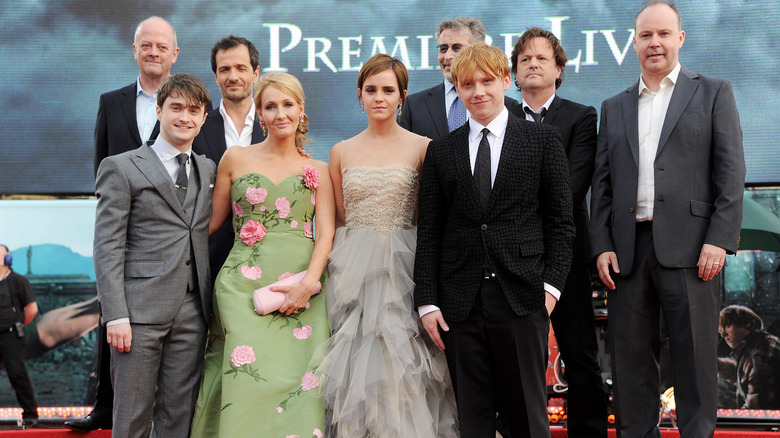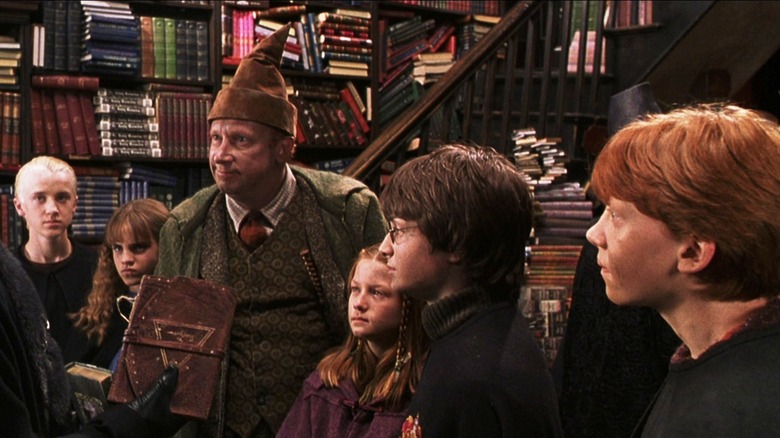Every Harry Potter Movie Has The Exact Same Problem
We're all familiar with "Harry Potter" at this point, between the original seven books by Joanne Rowling, the eight-part film franchise, the theme parks, the studio tours, the video games, the trivia nights, and so on and so forth. Hailed as the book that got kids back into reading throughout the 2000s, anything even slightly associated with "Harry Potter" is part of one of the biggest media franchises in history — which, of course, means that Warner Bros. and the minds behind said franchise will go ahead and keep milking the thing for all it's worth.
News broke in the spring of 2023 that a "Harry Potter" television series would eventually arrive on the HBO streamer that shall henceforth be renamed Max, stirring up a mix of excitement, confusion, and anxiety amongst fans. The original films ended their run in 2011, so this announcement came barely a decade after the source material was already adapted. This is to say nothing of the issues surrounding Rowling herself, who has decided to quadruple down on ugly stances regarding gender identities that have alienated countless fans.
It's tricky, though. One could argue that when you consider the sprawling nature of the "Harry Potter" books, perhaps they should have — like George R. R. Martin's "A Song of Ice and Fire" series — been adapted as a TV series from the outset. Looking back on the movies that we did get, let's put aside the problems with a "Harry Potter" reboot, and instead look at the big issue running through every single one of the original films: the fact that all of the depth, complexity, and darkness of the source material was never truly represented on film.
The first two Harry Potter movies are the most faithful adaptations, but also the worst ones
Let's go back to the first two "Harry Potter" movies. From the beginning, this series did not understand how to adapt the source material, and while the exact nature of this struggle wasn't always consistent, various forms of adaptation confusion just continually got in the way.
Back at the turn of the century, "Home Alone" director Chris Columbus directed the first two installments, "Sorcerer's Stone" and "Chamber of Secrets." To give credit where credit's due, they're extremely faithful to the events of the books. We watch as Harry (Daniel Radcliffe) gets his letter admitting him to Hogwarts, as he picks out his magic wand and makes friends with Ron Weasley (Rupert Grint) and Hermione Granger (Emma Watson), as he fights the Dark Lord Voldemort and uncovers frightening wrongdoings at his new school. This is exactly what happens in the first two books.
The problem with these two movies is that — to be blunt — they're just not good movies. Studios like Pixar and films like the "Paddington" series walk a fine line and craft children's entertainment that keeps kids happy and can be enjoyed by adults, but Columbus didn't pull this off. They're mostly faithful adaptations, but the tone and spirit are all wrong. In "Sorcerer's Stone," Harry fights against a man with two faces, one of which killed his parents, and he nearly dies. In "Chamber of Secrets," an extremely deadly giant snake nearly kills several Hogwarts students. All of this is presented as, on the whole, pretty cartoonish, not taking the source material seriously at all. These are kid's movies, plain and simple, and as a result, they don't stand the test of time as "Potter" fans grow up.
By Harry Potter and the Prisoner of Azkaban, the adaptation issues grow exponentially worse
Look, it's obviously tough to adapt such long books into a single film. "Order of the Phoenix" alone is a whopping 257,045 words and 766 pages. That said, even once the "Harry Potter" franchise learned to take itself more seriously, it also picked up a bad habit of both adding in new material that simply doesn't work at the same time as omitting major plot points.
Let's start with "Prisoner of Azkaban," which introduces the Marauder's Map, one of the most important magical artifacts going forward and one that shows you the location of every person in the immediate area, even if they're invisible. You know what's cool? Harry's dad and his friends made that map! You know what else? The movie does not tell you this. Meanwhile, "Goblet of Fire" is famous for Dumbledore (Michael Gambon) absolutely losing his mind when he's asking Harry if the kid put his name into the titular Goblet; in the book, it's specifically mentioned that he asked "calmly." In that same movie, the pre-Voldemort (Ralph Fiennes) villain is Bartemius Crouch Jr., played by the usually-excellent David Tennant. Nobody ever explains quite who he is, and if you hadn't read the book, you'd likely have no clue.
"Half-Blood Prince" is probably the worst offender here, what with its heavy focus on relationships, omission of most of Voldemort's backstory, and the burning of the Burrow, but "Deathly Hallows" doesn't help matters, cutting things like Wormtail's (Timothy Spall) dramatic death. Adaptation is hard, but the "Potter" movies frequently didn't even try.
Some Harry Potter characters radically change personalities from the page to the screen
This misunderstanding of how to properly adapt a book to the screen isn't just about leaving important things out or making up new events that don't fit — some of the characters become flat-out unrecognizable. Many fans would argue the perfect example of this is one Ginny Weasley (Bonnie Wright), who is so wildly neutered in the movies that she bears absolutely no resemblance to her book counterpart.
In the book version of "Order of the Phoenix," Harry realizes, with an assist from Hermione, that Ginny has gotten over her schoolgirl crush she harbored in her younger years and just ... moved on with her life, dating around and getting kind of extremely cool. Ginny's a talented witch who can dole out curses, a gifted Quidditch player who can switch from Chaser to Seeker without much trouble, and a genuinely funny character.
It's unclear if director David Yates told Wright to just exhibit zero personality as Ginny, but nobody is coming for the actress — it's the writing that causes this problem. Harry and Ginny have zero chemistry together and Ginny kind of just floats around doing nothing, diverging from the way she's presented in the books so wildly that it's hard to fathom that it's even the same character. Other characters get a short shrift, like Natalia Tena's Tonks (whose role is severely diminished), but the character assassination committed against Ginny is one of the film franchise's biggest crimes.
So many Harry Potter directors, and each one approached the material differently
Speaking of Yates, there's another problem that plagues the "Harry Potter" film franchise as a whole: the fact that four different directors worked on the movies, and each one tried to adapt the books differently, resulting in a mishmash of adaptation styles. Chris Columbus brought a tame, playful attitude to the first two films, which was fine, but not particularly thrilling. Though Alfonso Cuáron's direction on "Prisoner of Azkaban" was the best when it came to tone and the overall look and feel of the movie, writer Steve Kloves inadvertently handicapped him by overwriting Hermione's character (while diminishing Ron's) and leaving out things like that Marauder's Map detail.
Cuáron, one of the most talented directors around, couldn't return for "Goblet of Fire," so the studio brought on Mike Newell, best known for ... uh, "Four Weddings and a Funeral." Newell was not a good fit for "Goblet," as he was utterly unfamiliar with both the books and the previous films, and luckily, he was replaced thereafter by David Yates. Yates then helmed the remainder of the franchise, but he also didn't make all the right choices, and the damage was done after four totally different creators had worked on the same film series.
"Lord of the Rings" is a different animal all together, but the fact that Peter Jackson was the only person in charge of the original trilogy is a testament to why that strategy works. Furthermore, "Game of Thrones" – putting its ending aside — shows why "Harry Potter" would've always worked best as a major TV series, with one showrunner and plenty of room to tackle every aspect of the books, instead of cramming it all into individual, truncated films.
The fact is, Harry Potter should've been a series from the outset
What's frustrating is that the problems above could be fixed in a series that devotes a season to each book ... which is, presumably, the plan for the future Max reboot. One showrunner could smooth out the tone, a far longer run time could add back in elements that were left on the cutting room floor (justice for Peeves!), and a defining adaptation of "Harry Potter" could be created, right? Well, aside from Rowling's actively harmful stances, while it could be argued that the "Harry Potter" movies are deeply flawed, they're also they're a product of their time. Warner Bros. churned out movies at a pretty rapid pace, but it all worked out pretty well, considering how it could have turned out — and we shouldn't even attempt a do-over.
Even if "Harry Potter" should've originally been done as a TV series, that never could have happened back in the era that the first film was developed in, back before studios had learned to take fantasy seriously. The "Harry Potter" films weren't done perfectly, but they're a defining film franchise for a reason, and lazily diving back into the same intellectual property won't change the fact that the movies were unable to fix the unfixable issue of trying to pack giant, complex books into acceptable movie runtimes with streamlined plots. Whether or not the Max series even tries to mend these very specific problems remains to be seen, but for now, the films will live on and have these issues forever — and that's okay! For fans who want a do-over, though, one's coming.
